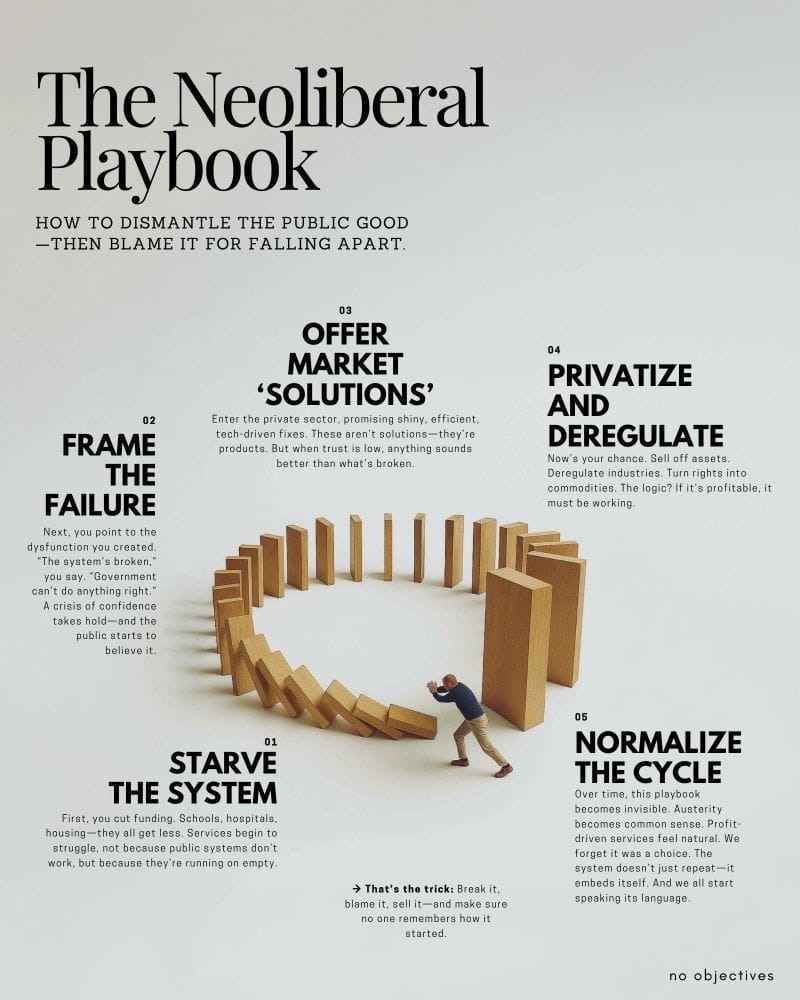- The Hope Dispatch
- Posts
- We’re probably all infected – but there’s a cure
We’re probably all infected – but there’s a cure
How to spot the neoliberal spin, ditch the doubt, and reclaim your imagination.

This piece is a longer one, and it wan’t fully formed by last weekend, so apologies if you missed your weekly dispatch of hope last week. It’s written to inform rather than uplift. But I hope that this knowledge feels empowering to you x Megan
We have a sickness taking over our globe. It’s not cancer or pneumonia – it’s neoliberalism. It's a virus that spreads by stealth. It infiltrates our institutions, our language, our sense of what’s possible. It doesn’t announce itself with fanfare; it whispers in boardrooms, scripts policy manuals, and even hijacks our nervous systems so we think ‘we can’t’ before ‘we can’. It has a higher R value than Covid, and the worst thing is you never realise you’re a carrier.
I was 9 when neoliberalism became the economic modus operandi on our shores, and it has infiltrated my own language and thinking over the course of a lifetime. Sometimes I have to reckon with my own inner voice, when I hear myself parroting the tenets “Governments stifle competition and innovation” “We are in tough times, so the Government should reduce spending on social programmes - and other nice to haves” “individuals should take charge of their own well-being.” “I have worked hard to get where I am”.
My mind has been colonised by these ideas, leaving me vulnerable. I realise now that I need to actively strengthen and inoculate my mind against these ideas that undermine my sense of the potential for human flourishing.
Hope needs trust to flourish, and at the moment, this virus has made it virtually impossible to know who and what to trust. That’s part of the strategy behind it.
So this fortnight’s Hope Dispatch is dedicated to informing ourselves about this ‘virus’ so we can beat it. We first need to be able to identify it, so we can protect ourselves against it, and then call it out and offer alternative narratives that will inspire people to reach for better economic solutions.
If you would prefer to listen to similar ideas in the format of a rollicking, meandering, neuro-spicy podcast about the neoliberalism project – check out Blindboy.
1. The sneaky neoliberal playbook: astroturf, smoke and mirrors
When I think “grassroots,” I imagine angry parents, neighbourhood protest signs, real folks with real names. But there are neoliberal proliferation groups that call themselves ‘grassroots’ who are running stealth campaigns, generating fake Facebook personas coordinated from shady marketing firms. They are here to infect our thinking, confuse us, divide us. This tactic is known as astroturfing.
Astroturfing isn’t just about hiding donors. Its best trick is manufacturing doubt. It makes people ask “Is this real? Who’s behind this? Can I trust anything?”
In 2020, Facebook took down a massive operation run by Rally Forge, a firm paid by Turning Point USA . Hundreds of fake accounts, pages, and Instagram handles had been masquerading as grassroots voices. The Guardian exposed how Turning Point secretly funneled $700,000 to Rally Forge to run campaigns disguised as left-leaning groups.
That doubt is paid for - every confused citizen, every divided conversation, every ‘both sides have a point’ moment adds value to the people funding the chaos. That doubt isn’t accidental, it’s a business model. The longer we argue about what’s real, the more time the funders have to cash in, deregulate, and disappear into the Cayman Islands. The truth is, civic confusion is profitable, and useful to the likes of vested interests like the fossil fuel industry. Reflecting back over 20 years of politics, I can see how this strategy has been utilised in issues ranging from climate change to race-equality, trans issues to abortion rights. It has us running around putting out tiny fires, while a raging bonfire is being fanned behind us.
2. How the virus infects our minds
The neoliberal script wants us whispering no before we think yes. Fear is its fertilizer.
Studies show challenging someone’s political beliefs lights up threat circuits in the brain, especially around the amygdala. That makes resistance and defensiveness the default.
Even structural brain work (tentative though it is) finds links between threat sensitivity and political conservatism. Please use this idea with care, but the pattern is there.
When a neoliberal lobbyist says “we can’t afford free health care,” the lie gets anchored in our visceral fear first. We react against the fear rather than for a better world.
Once fear rules the room, we forget how to dream.
3. Public wealth stripped, handed to private hands
You already know the outline: privatize, outsource, outsource some more. Then pay rent.

In New Zealand’s neoliberal era, big chunks of public infrastructure were sold off – airlines, rail, power, banking – shifting control from public to private hands.
The Accommodation Supplement in NZ is a case study in neoliberal rent-capture. The government (you, the taxpayer) now pays over $2 billion a year in this housing support, which is widely argued to leak to private landlords.
Analysts have called the supplement “a landlord subsidy by another name” especially when supply is tight and landlords know they can push prices. Public housing support is riding shotgun on private rental markets — the state paying, the private sector delivering.
Think of it this way: the state relinquishes its duty to house people, funnels cash to people it can’t guarantee housing, and then watches as that money lines private pockets. That’s not a safety net. That’s extraction.
4. The grand misdirection: government bad, corporations good
Here’s the coup de grâce of neoliberal messaging: we’re taught to fear the state, while corporate power slips by unnoticed.
The public has been primed to recoil at “big government.” But when Facebook harvests your data or Tesla mints your carbon offset coins its considered innovation, not vast overreach.
The Cambridge Analytica scandal is a landmark: private actors using personal data to influence elections, shaping minds for sale. We outsourced our attention to algorithmic monarchies.
Meanwhile, Turning Point transformed itself from a campus network into a political brand backed by donors. In 2022, their funding reportedly hit $79 million.
Think about it: when an election is run by targeting our fears; fear of difference, fear of scarcity, we turn to blame the government for stepping in. We don’t tend to blame the algorithm or the private funders behind that algorithm.
5. The world the virus built: imagination locked down
“It’s easier to imagine the end of the world than the end of capitalism.” That’s from Mark Fisher, and he’s right. Under neoliberal rule, we’ve become ideologically mute.
We’re corralled into a binary: you’re either “capitalist” or “socialist.” Never mind that governments already serve corporate power in many cases.
The imagination is policed. Suggest public housing? They whisper “socialism.” Suggest a universal public option? They call it “nanny state.”
The virus tricks us into thinking the only alternative to neoliberalism is state tyranny. The real tyranny –corporate overreach– is rebranded as benign.
6. How we beat the virus together
This is not theoretical. We have bones, hearts, and communities. We have ideas. Here’s how we reclaim our power:
Build (back) public infrastructure that belongs to the people. State-led housing, public land trusts, community land banks so land value stays in our hands. And never, ever, sell it again.
Reform subsidy designs. Rather than endless rent supplements, invest in building homes people can afford. Redesign payments so they don’t just feed landlords.
Public digital commons. Offer/support real alternatives to surveillance capitalism– communication platforms built for democracy, privacy-first, publicly governed.
Co-operatives and collective ownership. Where markets fail or concentrate power, let worker co-ops or community ownership be the default, not the niche.
Democratic imagination exercises. Workshops, public dialogues, art, stories — we reclaim what stories we live by. Let people dream beyond can’t.
Accountability and disclosure. Force astroturf and dark money into daylight. Make political influence transparent. Expose the playbook.
Neoliberalism didn’t defeat democracy. It tricked us into complicity, taught us to fear the public, to devalue the collective, to submit to private power. It lives in our speech, in our laws, in our logic.
But it is not inevitable. The virus can be treated. We can inoculate communities through care, rebuild public infrastructure with intention, press for transparency, reclaim our minds, and demand a better default. But first, we need to understand it, so we can recognise its hallmarks.
We deserve a world where “We can!” is our loudest reflex. Let’s write that world. Also, congratulations for reading all the way to the end. I appreciate your precious attention.
xxx Megan
Reply